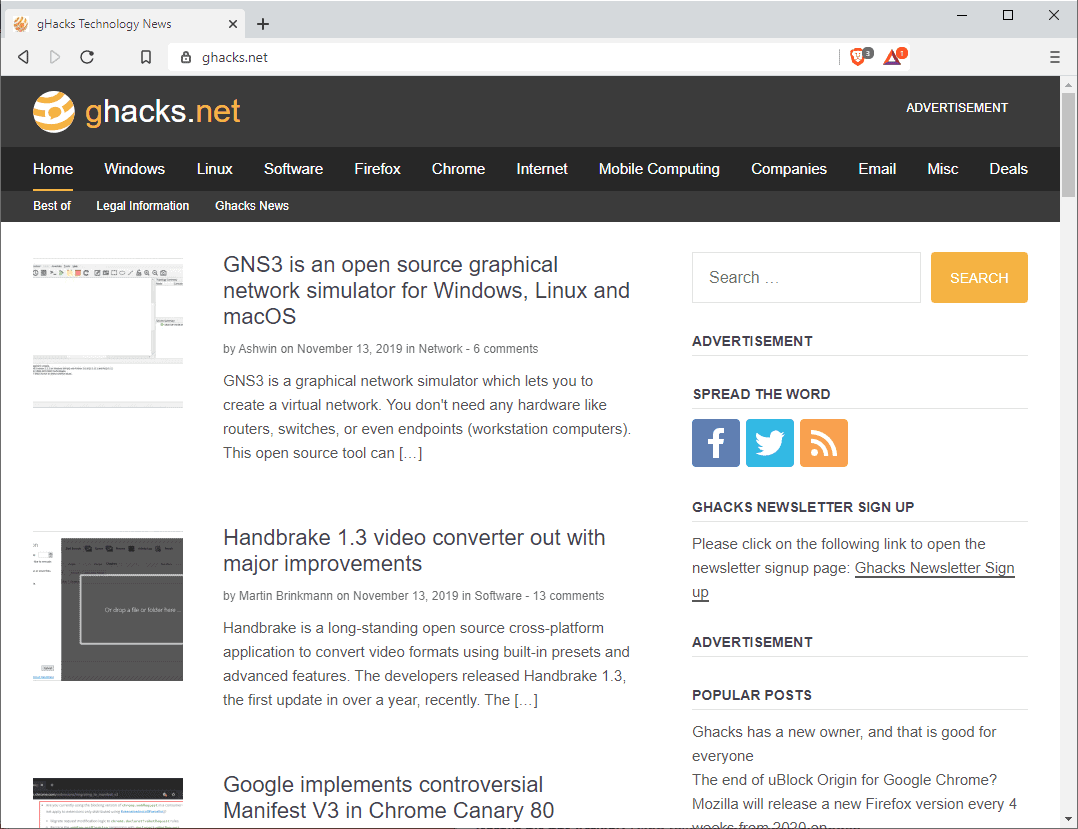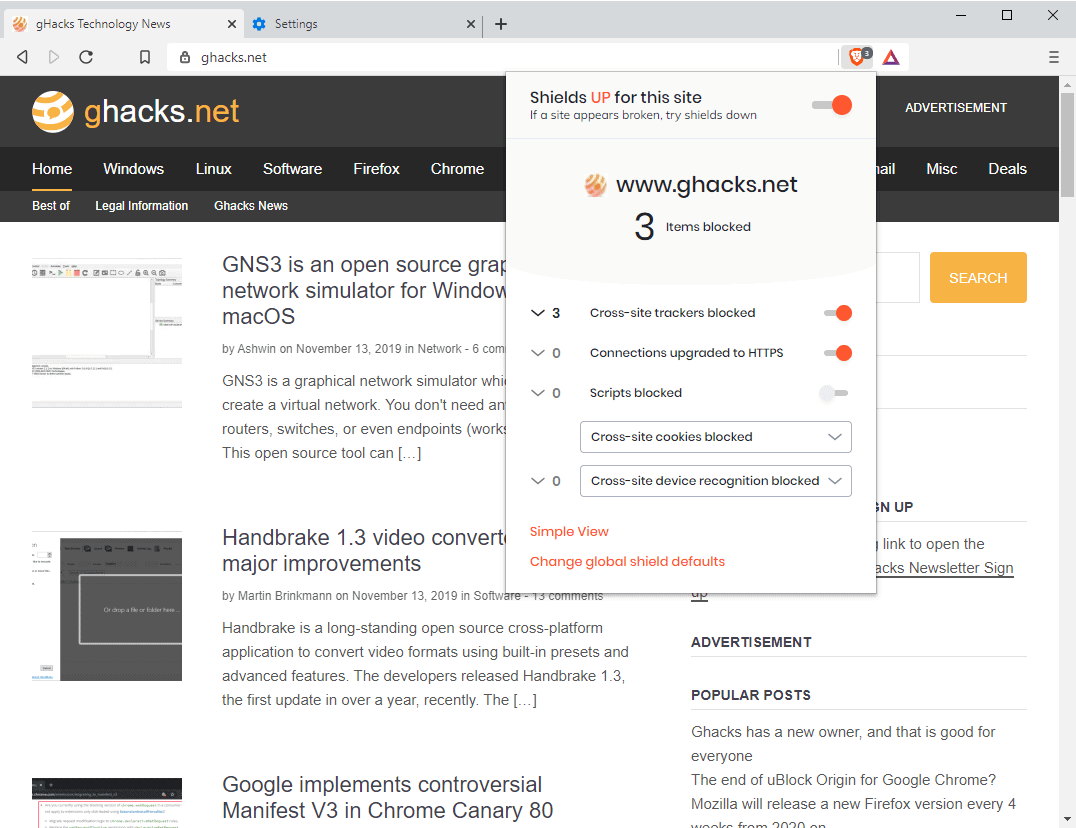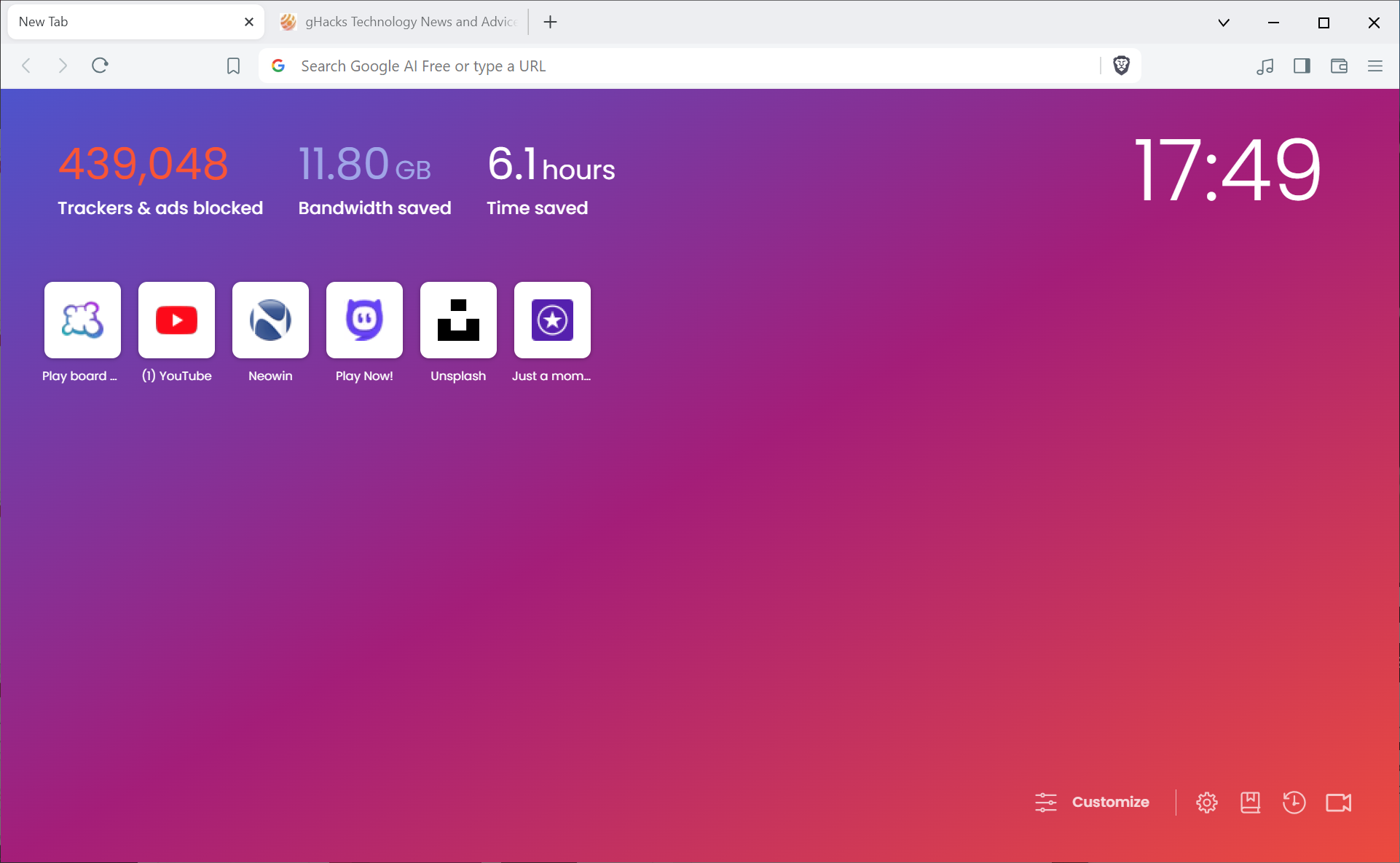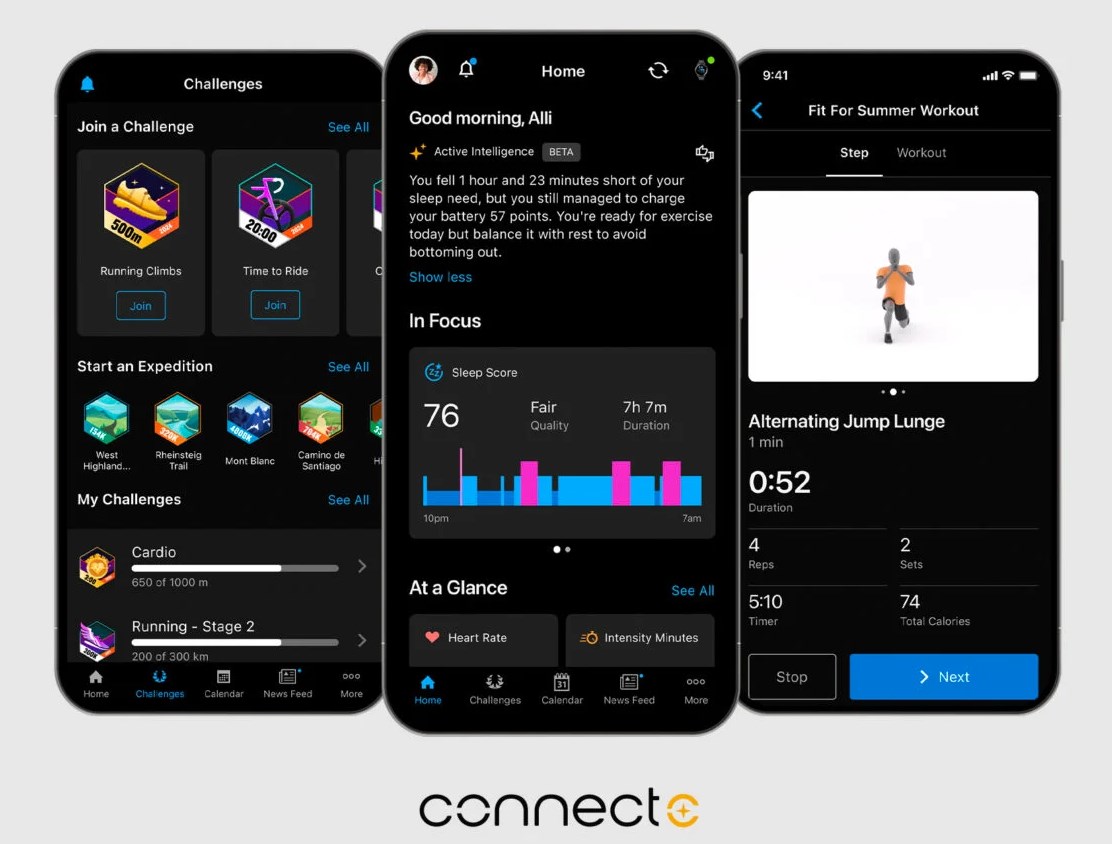Brave Browser 1.0 is now available

After more than four years of development, Brave 1.0 has been released by Brave Software to the public after the release of Brave Beta 1.0 in 2018.
The new and first final version of the Chromium-based web browser -- the same core that Google Chrome, Opera, Vivaldi and the new Microsoft Edge browser as well as hundreds of other browsers use -- can now be downloaded for Windows, Mac OS X, Linux, and the mobile operating systems Android and iOS.
A lot has changed since our first review of Brave in 2016; the browser has matured and the general idea behind it -- to disrupt online advertising through the creation of a privacy-focused cryptocurrency-based alternative -- started to take form only recently.
One of the core ideas of Brave is to create a revenue system for the Web that benefits publishers, users, and the company alike. Brave features native ad-blocking functionality and fingerprinting protections which improve page loading performance and battery life.
Tip: check out our guide on speeding up the Brave browser further.
Benchmarks, provided by Brave, suggest that it "saves an average of 27 seconds per page load against Chrome on macOS and 22 seconds per page against Firefox", and that the browser "uses 58% less data than Chrome to load those same pages". Brave furthermore uses less memory than Chrome or Firefox according tot he company improving memory use by "40% over Chrome and 47% over Firefox".

Brave created a new "blockchain-based advertising model that reforms the current system with privacy by design and 70 percent revenue share to users in the form of Basic Attention Tokens (BAT)". Users may opt-in to view ads to earn BAT which they may convert into digital assets and fiat currencies, or use to support their favorite publishers, content creators, and companies.
According to Brave Software, "ad matching happens directly" on user devices which means that data is not sent to anyone.
Brave supports several interesting features. Apart from standard functionality such as data synchronization, Chrome extensions support, or support for light and dark themes, it does support features such as built-in Tor network functionality (which means that you may use it to access onion sites), support for web torrents, or integration of IPFS (Interplanetary Filesystem).
Brave blocks advertisement by default and provides control over the behavior in the main user interface and settings.

In the main UI, users may disable ad-blocking for a site or change blocking related options, e.g. to enable script blocking or disable HTTPS upgrades.
Brave users who join Brave Rewards join the Ads program automatically as well which may show them privacy-preserving ads in exchange for BAT currency. Users who don't want to join Ads may disable the functionality on the internal brave://rewards page.
Closing Words
Brave Software revealed that the browser has about 8.7 million monthly active users currently; it would need a lot more to really disrupt online advertising. The release of Brave 1.0 is a milestone for the company and may accelerate growth further.
Now You: Have you tried Brave? What is your take on the browser and idea?























Disabled AV. Disabled Firewall.
I can’t make it install.
The last days i was using this browser and it is so fast. Good browser
Nice article!
Brave has been my go to browser since they switched from their Muon core to Chromium base. Just turn off the Rewards feature and it’s very fast and stays out of your way. I’ve seen a lot of misinformation posted by others, so I’d like to say this:
Brave is based on Chromium, but with a lot of changes in the name of privacy or performance.
I found this page pretty enlightening: https://github.com/brave/brave-browser/wiki/Deviations-from-Chromium-(features-we-disable-or-remove)
Those changes plus native-level ad blocker built in rust and the cryptostuff.
Looks promising, I will give it a try only for the speed, and after all, Firefox have become such a process heavy memory crunching sludge of a browser.
Benchmarks, provided by Brave, suggest that it “saves…
I suspect that Brave’s statistics are comparing their loading times (with built-in partial-ad-blocker) against other browsers with no ad-blocker at all. But the kind of person who would even know about Brave, much less install it, is the same kind of person who _would_ be using an ad-blocker in Firefox. In other words, apples and oranges. What is Brave’s loading speed vs. Firefox with uBlock Origin installed?
Also, it’s hard for me to understand who cares that much about page loading speed anyway… until I remember that I almost never see _any_ ads online (uBlock Origin + extra filters + custom blocks I’ve added to it + my Hosts file)… but then I remember that browsing may be an entirely different experience for most people, who don’t understand anything technical and don’t customize anything. I guess I don’t even know what “mainstream” browsing is like.
If the arrogant devs at Mozilla cripple ad-blocking to kiss Google’s ass… which I’m guessing they will eventually… I may start using my ancient Firefox 52.9.0 more often (now I just use it for web development because of the superior XUL extensions). I might have to limit the new crippled/official Firefox to security-critical uses (like online banking) only. It’s not just the ads; uBlock Origin blocks various malware too, and I trust its devs a lot more than I trust the ones at Mozilla.
“According to Brave Software, “ad matching happens directly” on user devices which means that data is not sent to anyone.”
Yeah, right, the ads come from someplace, maybe Brave downloads every ad in the universe to your browser just in case?
I like their use of a proxy to shut down Chromium’s nasty, unmodifiable aspects but the explanations of their ad model are getting rather silly. The only part of it that’s clear (maybe) is ads are off by default.
I tried Brave when it first came out; it was slow and the interface was clunky. With system level blockers becoming more commonplace, their proxy approach is no longer special; it can be found elsewhere independent of browser choice.
Brave was delisted by privacytools
https://www.privacytools.io/browsers/
Ver 1.0.0? Four years late, Bravers.
Well, they beat Clam!
1. If you’d bothered to use Brave in its latest non-Electron incarnations, you’d have seen how ads really work: they are *not* injected into pages you visit. Instead, they show up as system notifications on your laptop/device, and you can decide to click on them or not. Having used Brave for a bit, it looks like they currently have a limited pool of ads (so not “every ad in the universe”) which are mostly about cryptocurrencies.
2. Brave was delisted by PTIO *at the Brave team’s own request*, as per various sub-reddits.
3. People complain bitterly about Mozilla and Google’s rapid-release schedule, and now you are unhappy with Brave’s slow-release schedule. Can’t please everyone I guess.
Have previously tried Brave. last version I think.. one thing I did like was the overall speed of the browser but did not use their proprietory blocker, instead I opted for solid 3rd party blockers ublock Origin, Privacy Badger etc.
What I don’t like is this BAT scheme..where there is value (tokens) there is a reason for miscreants to look for vectors to exploit in a browser…no thanks.
Having said that, I uninstalled a previous version after testing only to find multiple brave/chrome tentacles still resident in my trimmed registry that took wasted time to remove.
Drop the BAT and run..browser rounders
I am *starting* to think I will stop visiting this site after using it for what …10 + years?? Softsonic linking? Sure. I am savy enough to not click those kind of urls and instead right click and look for an official link instead or copy the link and remove the tracker/referrer link in a private tab.
PS: I also sent Martin articles of interest that he might have missed out. No longer so now.
The “real link” is there. I understand that this change may not be liked but if this is the extent of the changes applied to this site, it surely is not turning the site upside down.
“if this is the extent of the changes applied to this site, it surely is not turning the site upside down.”
It’s not turning the site upside down, but we heard that story before. First, nothing will change don’t worry, then only that will change for worse don’t worry. Then what ?
Can I buy an AK47 with those BAT e-money?
The only thing I like about Brave is Yan.
Dude…
Tried it. Can’t downlaod the full package, just the installer front end, so actually can’t examine the binary before installing or install it offline.
32 bit version crashes on install (after downloading payload, not the front end installer) on XP, but there’s no XP test or statement XP not supported.
XP. Lol. TimH the OS misfit.
Devices running Windows XP that connect to the internet need to be bricked.
Kinda embarrassing https://community.brave.com/t/brave-update-seems-to-have-a-problem/92725/3 …then again, this fits perfectly on a Windows 10 potato.
Yep, they made sure that the softsonic link is the obvious one. It doesn’t take long to ruin a site.
What happens if we keep shields up on YouTube with their new terms of service coming? Do we risk losing our Google accounts?
Tried it once, it’s a niche browser trying to balance ad blocking with rewards for sites with good ads? The model tries to target users who hate ads but feel bad for sites who suffer from revenue losses from those users. Just doesn’t seem to be a really good model for the masses where they would just install a ad blocker as a extension and forget about it.
I noted a first significant bad consequence of the purchase of Ghacks by Softonic: the software downloads links now point to Softonic instead of the official sites (with a tracking URL as a bonus)
https://brave-browser.en.softonic.com/windows?utm_source=ghacks&utm_medium=referral&utm_campaign=recommendations&utm_content=button
Even if Softonic is no longer blocked by ublock origin because it apparently stopped spreading badware, it is still a site with the same shady owners that I wouldn’t recommend anyone to download from like most of similar software download sites, and independently of that it is still an ads and tracking filled site, and it is generally bad practice not to point to the official site for software downloads, as you know well yourself. But at least the Brave installer from Softonic seems to have the same hash as the one from brave.com .
If you sincerely thought that this softonic site brings more value to the users than it takes from them, you would have already used softonic links before being bought by them, but you did not. I’m not sure if this counts as a Softonic influence on the editorial content.
Mark never ever failed to give the landing page. I don’t mind his giving the softonic link, he has to survive this project, plz try to understand… I download many times from softonic but I try to have protections at my end. Kindly appreciate his honest approach.
The link to the developer site is in the summary box below the article or in the article itself as well. There will always be a link to the developer site.
You say that will always be a link but there is not
What do you mean? The link to the Brave site is in the first sentence of the article.
You said “We use the “review†summary box with the rating and link to developer site only for reviews.”.
Like on other application reviews that you have put link to the developer site on the summary box.
On this article there is nothing. Just on the sentence which anyone can miss. Don’t get me wrong, I don’t mind the link to Softonic at all. You need to make money and I understand but I believe the link to the developer site should be on the summary box. You are doing a great job. Keep up the good work :)
In this article and the newer Opera 65 one, so in fact for new articles since today, the links to the official sites do appear in the article itself, but do not appear any more in the summary boxes, probably as an intentional new policy to push users to use Softonic instead to download.
No that is not the reason. We use the “review” summary box with the rating and link to developer site only for reviews. The “general” summary box is used for news which this is.
We may need to think about this if this is too confusing.
I’ve used this since it was first in to beta but have recently given up because of the mess that is sync. They know it is and are working on it so hopefully they will sort it out.
The thing for me is that Vivaldi have really improved their general speed and sync just works so I’m not 100% sure I need to switch back as I really don’t care about BAT. I guess it depends if they can actually ignore the manifest v3 changes.
A browser that makes money not only by showing its own ads, but by targeting those ads on the users browsing data. And they have the guts to call this privacy-focused, or privacy-perserving. Disgusting.
Yes, it is more private than sending data away, and this is what they communicate on, as surveillance capitalists. But what actually matter is that it is less private than not exploiting browsing data to target ads: this is very privacy hostile, period. This is as “disrupting” as adblock plus taking money from “nice” advertisers to whitelist their ads. It’s damaging privacy much more than helping it, when taking everything into account.
Even their middleman scheme to take their fee on donations intended for sites is smellier than what it looks like, because at first they were taking *and keeping* donations for sites that rejected this racket because Brave had not asked their permission to collect donations in their name.
Ad targeting happens client side, no data leaves your computer, it’s not a privacy concern at all. And all donations that don’t go through are spread across other Brave users as free token grants, Brave doesn’t keep them.
You could have easily looked this up, but you chose not to. Disgusting.
“Ad targeting happens client side, no data leaves your computer, it’s not a privacy concern at all.”
I feel that it really needs to be insisted on how scummy this new definition of privacy by Brave is, because I don’t think you guys really understand what this implies. I am sure many of you are buying their sales pitch.
By their redefinition, if Brave accessed all your private files on your computer to target their ads client side, that would be *not a privacy concern at all*. If Brave used the microphone to collect surrounding discussions at all time to target their ads client side, that would be *not a privacy concern at all*. If in an hypothetical future Brave used a brain interface to target ads on your private thoughts client side, that would be *not a privacy concern at all*.
Do you start getting the idea now ? As soon as your private data is used to target ads, there is no privacy, no matter how it’s done. Surveillance capitalists are just desperately trying to find a future-proof way to go on squeezing our private data for ad money when their current favorite ways finally become illegal.
“it’s not a privacy concern at all”
Brave’s opinion, neglecting to even discuss the objections of the comment your replied to. Surely trustworthy. While we discuss it they make money by advertisers from users browsing data.
“And all donations that don’t go through are spread across other Brave users as free token grants, Brave doesn’t keep them.”
It’s worse than I thought. I thought that after the scandal it made, they had just stopped taking donations for sites that they would keep for themselves in fact. You brave shill now explains with a smile that they *still keep it* (and do whatever they want with it afterwards but do not give it to the sites that they were intended for).
“You could have easily looked this up, but you chose not to. Disgusting.”
I wasn’t aware that Brave was still keeping donations that they claim are intended for sites, thanks for informing all of us on this. Before talking you should learn then when you’re scummy enough, clarifying what your company is doing might actually damage your revenue.
Too much marketing bullshit to my taste.
I like it but I had to turn the adverts off eventually as they appear on the desktop like Windows notifications which I found too intrusive. There also did not seem to be any way to silence the notification sound on my phone so it kept going off like there was something important but it was just an advert.
I thought the ads would actually be inserted on the web pages which would be better but I expect more technically difficult.
Those are not the usual adverts. When you open a webpage and tells something like “crappysite.com wants to send you notifications” say no to them.
Or better yet, just turn off this inherited Chrome feature in chrome://settings/content/notifications?search=notifica
No, Sopota, he is talking about Brave Ads, those ads that don’t use your personal info that show up as Windows notifications. It’s the thing you can disable in chrome://rewards/.
I actually like it, it basically generates a few BAT for me in exchange for some annoyance. Then I have Brave Rewards enabled so those BAT go to the sites I love
The Dissenter browser is the Brave browser minus all the evil stuff.
BTW, why would I use Brave, when Manifest v. 3 is already in Chrome Canary & Chromium (IOW, Manifest v. 3 is coming to Brave)?
When Manifest v. 3 is fully implemented (no fallback to v. 2), then Firefox will reign supreme.
Thanks for the tip!
Because brave won’t be affected by Manifest v3, that’s why.
https://twitter.com/brave/status/1088914000379731970
as for firefox reign supreme, don’t be so sure about that
“We have no immediate plans to remove blocking webRequest”
https://blog.mozilla.org/addons/2019/09/03/mozillas-manifest-v3-faq/
Noticed the”no immediate plans” weasel word?
@GuyFawkesEvilTwin, you’re pretty stupid if you believe Brave’s PR lies.
Brave doesn’t have the financial resources to maintain a browser engine, that’s why they use Goolag’s Blink engine.
There’s a big difference between adding a little code vs. maintaining a fork of a browser engine.
The last successful browser fork was Blink’s fork by Goolag (a huge multi-national corporation with almost limitless financial resources) of the Webkit.
Brave will “bend the knee” to Manifest v. 3, they have no choice.
Brave adblocker is not an extension, it is part of the core app which they created from ground up using Rust.
Tried early development versions, became frustrated by the slow pace of repair for reported issues. Gave it up. Now it is released, its time for another try.